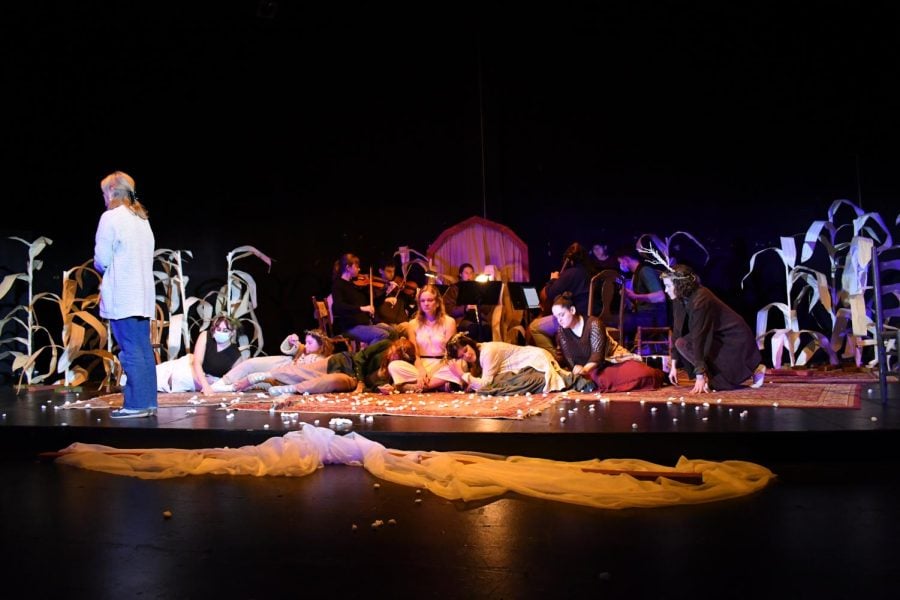‘creating small thunder’ brings queer, rural story to Northwestern opera
Photo courtesy of Maggie Davidson
A performance of “creating small thunder” in Mussetter-Struble Theater. The opera held four shows over the weekend.
May 1, 2023
Content warning: This article contains mentions of death.
A mother sits on the ground, pouring salt into her hands. She sprinkles it around her before devouring a tomato, conducting a ritual with thyme and dirt.
This nature-based rite is at the heart of “creating small thunder,” an opera written, composed and directed by Communication and Bienen sophomore Mya Vandegrift. “creating small thunder” follows two moms and their two daughters living on a rural farm, and deals with themes of loss after one mom dies in a fire.
Students performed the work over the weekend at the Virginia Wadsworth Wirtz Center for the Performing Arts’ Mussetter-Struble Theater, attracting more than 300 audience members over the course of four shows, according to Vandegrift.
Vandegrift said she began the project in August 2021. A native of rural Ohio, she knew she wanted to tell the story of a queer family in the rural Midwest while avoiding the trope of a coming-out narrative.
“I wanted it to be just a natural story about maternal loss and the cycles of death and rebirth that are so present in rural America through the act of farming and compost and photosynthesis,” Vandegrift said.
The opera features one character grieving the loss of her wife as their daughters fight and subsequently heal their relationship. Their deceased mother haunts the stage, watching her family cope. Members of the chorus, dressed in earthy tones and donning ringlets of leaves and branches, dance and sing around the family.
During the show, song subtitles were projected onto the back wall of the theater along with words relevant to the plot — like “salt,” “tomatoes” and “make me / remake me.”
Scenic designer and Communication sophomore Sam Webster said she felt excited from the start about getting to inhabit the world of “creating small thunder.”
Because opera scripts tend to be “a little more abstract,” Webster said, she had creative space to translate Vandegrift’s ideas into her own vision. Webster began by identifying crucial elements of the setup, like furniture, before building a naturalistic visual language and supervising the creation of more than 200 wire-and-masking-tape leaves to attach to PVC-pipe corn stalks that frame the stage.
She emphasized the outdoors, the sky and the Earth in her designs to communicate a “cozy and enveloping and warm” feel.
“It’s just so lovely to be able to see representation of stories emerge through different, various art forms — and being able to expand queer storytelling and storytelling that feels very integrally related to environmentalism and the earth,” Webster said.
The team of 30 people working on the opera became “like a family” throughout the process of developing it, co-music director and Bienen sophomore Khoi Le said.
Bienen sophomore Eliza Reimold, also a co-music director, said she and Le started working on songs about a year ago. Reimold said she felt proud of the emotion they conveyed when she looked into the audience at the end of the last show and saw “all these shining, tear-soaked faces.”
“Whether it’s music or theatre,” she said, “I think the reason why I love performing is being able to give people the opportunity to process their own experiences — through art or through an emotional experience.”
McCormick senior Jazmyn Lu attended the opera Saturday and said the “beautiful” portrayal of complex family relationships and queerness in rural areas resonated strongly with them.
As audience members left, Vandegrift said she hoped they pondered the question: What are ghosts, if not loved ones staying with us?
Beyond that, though, she wanted audiences to take away a new appreciation for opera.
“Opera is not dead. It is a very much alive art form,” Vandegrift said. “Operas can be accessible in a digestible time and in English, and they can be about queer people and all sorts of other stories.”
Email: [email protected]
Twitter: @avivabechky
Email: [email protected]
Twitter: @karapeeler
Related Stories:
— Davóne Tines reimagines Mass through opera at Galvin Recital Hall
— Northwestern Opera Theater explores gender, yin and yang with ‘The Magic Flute’
— ‘Indecent’ brings true story of antisemitism, Jewish theatre and the value of community to Wirtz












